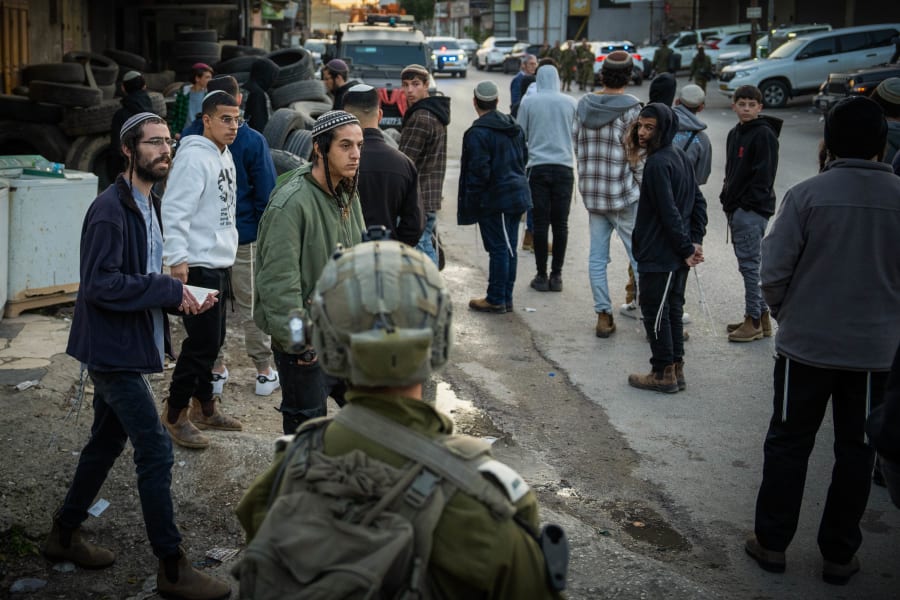Jewish settlers carry out reprisal attacks against nearby Palestinian villages after 3 Israelis murdered in terror shooting
High Court demands answers from police for failing to prevent attacks on Palestinian villagers

Radical Jewish settlers rioted in several Palestinian villages in Samaria on Monday, after Palestinian terrorists killed three Israelis and wounded seven others in the same area earlier.
On Monday morning, two terrorists opened fire on a car and a bus driving through the village al-Funduq, killing off-duty police officer Elad Yaakov Winkelstein (35), and two women from the nearby town of Kedumim, Rachel Cohen (73) and Aliza Raiz (70).
The terrorists fled after the shooting and haven’t been caught yet, despite a large manhunt by Israel Defense Forces.
Throughout the day, radical settler groups published calls for revenge online, according to human rights groups. In the evening, riots were reported from villages around al-Funduq, including Far’ata, Immatain, and Hajjah, where the IDF has security control under the Oslo Accords.
In Hajjah, Palestinian reports said that settlers set fire to vehicles, with Ynet News reporting that some 80 settlers took part in the riots. Others threw stones at homes and destroyed crops in Far’ata and Immatain.
According to Ynet, the IDF had prepared some measures to prevent reprisal riots but failed to prevent them. The army said it received several reports of “Israeli civilians who entered the village” in Hajjah and had “caused damage to property.”
Meanwhile, the IDF continued its search for the terrorists by creating additional roadblocks and entering the surrounding villages.
Violence by groups of radical Israeli settlers against Palestinian civilians has risen in recent years and particularly, since the Oct. 7 invasion, with critics arguing that the IDF and Shin Bet (Israel's security agency) have not done enough to curb the phenomenon.
National Security Minister Itamar Ben Gvir has been a special focus of criticism. While Shin Bet and the IDF have raised the alarm about the phenomenon several times, Ben Gvir dismissed the claims and has argued that youths damaging property receive outsized attention.
Before entering politics, Ben Gvir was the defense lawyer for several settler youths accused and convicted of violence against Palestinians and Christians.
Meanwhile, the High Court on Monday demanded answers from the police as to why its instructions to curb settler violence in southern Judea had not yet been carried out.
The case involves a petition by Palestinian residents of Khirbet Zanuta, who complained that the police and IDF have not fulfilled the court’s orders to enable them to safely return to their village, which they vacated in October 2023 due to attacks from nearby Israeli communities.
In the meantime, several houses and a school building in the village, funded by the European Union, were destroyed or damaged.
Acting Israeli Supreme Court President Isaac Amit reportedly slammed the table at one point during the hearing, telling a police representative, “Not a single indictment had been filed. We see settlers inside their homes. Nothing has been done.”
Chief Inspector Aviad Balmas, the head investigator for the Hebron district, argued that the police regularly send officers when complaints are made but struggle to enforce the law.
By the time officers arrive, they don’t find anything, not even those who filed the complaints, Balmas argued. “There are no real [land] boundaries. So a flock goes through with the [Jewish] shepherd, in an area without anything, no crops, so the shepherd’s sheep go into the Palestinian land. What am I supposed to do now? A police car will come, take the shepherd, and the sheep will scatter?”
Regarding claims of violence, Balmas explained: “We send a car to every incident. The area is huge. We investigate and summon people for questioning. The fact that there are complaints does not mean all of them happened.”
Further complicating the issue is the fact that most houses in the village were built illegally in the 1980s, after the nearby caves they had lived in began to deteriorate.
In 2007, Israel’s Civil Administration, which governs the area, issued demolition orders for the homes. After a legal struggle, in 2017, the state said it would draw up a zoning plan for the area and would not implement the demolition orders until then.
Despite this, the Civil Administration told villagers in September that it would carry out the demolition orders if they did not agree to relocate, preventing them from repairing their damaged homes.

The All Israel News Staff is a team of journalists in Israel.
You might also like to read this:
















